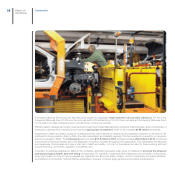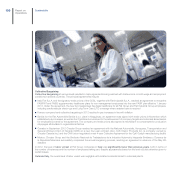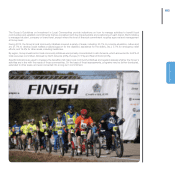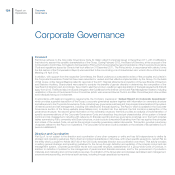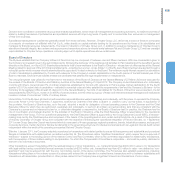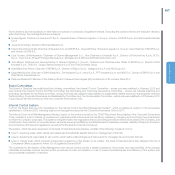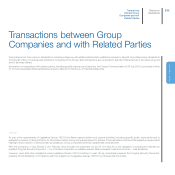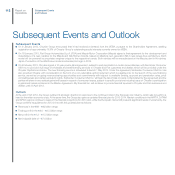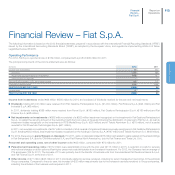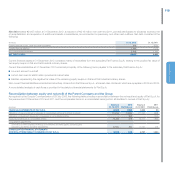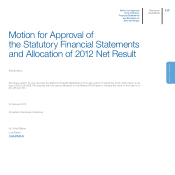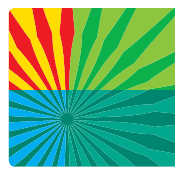Chrysler 2012 Annual Report Download - page 109
Download and view the complete annual report
Please find page 109 of the 2012 Chrysler annual report below. You can navigate through the pages in the report by either clicking on the pages listed below, or by using the keyword search tool below to find specific information within the annual report.
108
The Company has developed a system of internal control and risk management in relation to financial reporting based on the model
provided by the COSO Report aimed at ensuring the reliability, accuracy, completeness and timeliness of the information reported.
The periodic evaluation of the system of internal control over financial reporting is designed to ensure the overall effectiveness of the
components of the COSO Framework model (control environment, risk assessment, control activities, information and communication,
monitoring) in achieving those objectives. As mentioned previously, the principal characteristics of the system of internal control and
risk management in relation to financial reporting are provided in the Annual Report on Corporate Governance.
Fiat has administrative and accounting procedures in place that ensure a high degree of reliability in the system of internal control over
financial reporting.
Documents and financial information regarding the Company are made public, including via the internet, in accordance with the
provisions of the procedures for the internal management and public disclosure of confidential information adopted by the Board of
Directors in 2006 and 2007.
Essential components of the Internal Control System are the Code of Conduct, adopted in 2002 to replace the Code of Ethics and
revised in 2010, and the Compliance Program, adopted by the Board of Directors in implementation of regulations on the ‘Liability
of Legal Persons’ pursuant to Legislative Decree 231/2001, as amended. The Code of Conduct sets out the ethics principles to which
the Company adheres and which directors, statutory auditors, employees, consultants and partners are required to observe.
On 20 February 2013, the Board was presented Fiat S.p.A.’s revised Compliance Program and Guidelines for Adoption and Revision
of the Compliance Program by Group companies in Italy, which incorporate new categories of offenses introduced in Italian legislation.
With these amendments, new criminal offenses were included and the relevant sensitive processes were identified. Legislative Decree
109/2012 introduced as Article 25-duodecies of Legislative Decree 231/2001 the offense of “Employment of foreign nationals residing
illegally in Italy” (Article 22 (12-bis) of Legislative Decree 286/98, which addresses immigration and legal status of foreign nationals). Law
190/2012 introduced the offense of being induced to give a bribe as Article 25 (3) and the offense of bribery between private individuals
as Article 25-ter (1)(S-bis) with direct reference to Article 2635 (3) of the Civil Code which establishes penalties for giving or promising
financial or other advantage to directors, managers, statutory auditors or employees of a company.
The Compliance Program Supervisory Body is composed of the head of Audit & Compliance, the General Counsel, and an external
advisor. It has its own Internal Policies and Procedures and operates on the basis of a specific supervisory program. It meets at least
once per quarter and reports to the Board of Directors (including through the Internal Control and Risk Committee) and the Board of
Statutory Auditors.
In application of the Compliance Program, the Code of Conduct, and the provisions of the Sarbanes-Oxley Act (to which the Company
was subject while listed on the NYSE) on whistleblowing, the Whistleblowing Procedures were adopted on 1 January 2005 for the
management of reports and claims filed by persons inside and outside the Company in relation to suspected or presumed violations
of the code of conduct, fraud involving company assets or financial reporting, oppressive behavior towards employees or third parties,
reports or claims regarding accounting, internal accounting controls and independent audits.
The Procedures for the Engagement of Independent Auditors regulate the engagement of audit firms and other related parties,
by Fiat S.p.A. and its subsidiaries, in order to ensure the independence of firms engaged to audit the financial statements. Related
parties of an audit firm are considered to be entities belonging to the same network, as well as equity partners, shareholders, directors,
members of management and supervisory bodies and employees of the audit firm.
With reference to the “Conditions for the listing of shares of companies having control over companies incorporated and regulated
under the laws of a non-EU member State”, pursuant to Articles 36 and 39 of the Market Rules, the accounting systems in place at
the Company and its subsidiaries, as discussed in the Annual Report on Corporate Governance, enable public disclosure of certain
accounting information prepared by companies included in the scope of application of the Regulation and used in preparation of the
consolidated financial statements and are adequate for the regular provision to management and the Parent Company’s auditors of
information necessary for preparation of the consolidated financial statements. In addition, there is an effective flow of information to the
Parent Company’s auditors, including regular information on the composition of corporate bodies within all subsidiary companies and
the position held by each member. The Company is also responsible for systematically maintaining and updating centralized records
of formal documents related to the by-laws and delegation of powers to members of the corporate bodies. The requirements of Article
36 (a) (b) and (c) of the Market Rules issued by Consob have therefore been satisfied, including in relation to the acquisition of control
of Chrysler Group LLC during 2011.
Report on
Operations
Corporate
Governance


